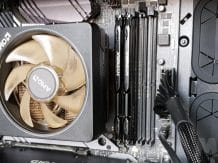Windows 11 is reported to be slowing down some SSDs
It’s been two months since Windows 11 was released to users, but the operating system has gotten its fair share of negative publicity, especially when it comes to performance. And now, reports are emerging claiming that the operating system is slowing down some SSDs.
Image Credit: Microsoft Forums.
Users have shared screenshots showing the results of benchmarking of unit measurement tools, such as CrystalDiskMark, Samsung Magician, etc. Just by looking at the pictures, you can tell that there is a problem. Screenshots reveal that random write speeds have been halved in Windows 11, compared to benchmarks taken in Windows 10.
Interestingly, most of these complaints have something else in common, the problem seems to be prevalent among users with Samsung NVMe SSDs. Some comments in the forums indicate that the problem does not affect Intel Optane SSDS.
Another theory rules out the possibility of VBS (Virtualization Based Security) impacting performance as the option was disabled before benchmarking. Some users have claimed that disabling the option has improved their system speed; Optionally, you can test it by going to Windows Security> Device Security> Kernel Isolation and toggling the Memory Integrity setting. You may also want to disable Animation Effects in the Accessibility options in the Settings app.
Another couple of threads posted on the Microsoft Feedback Center, and on Reddit, many users have discussed the issue. This issue has not cropped up at this time, it appears to have been around for about 3 months. That’s long before Windows 11 was released, meaning Microsoft didn’t address the concern while the operating system was in the preview phase and shipped it as is. Users seem to be in the stable channel of the operating system, and the consensus is that there is a bug in Windows 11 that affects the performance of SSDs. It’s that or some faulty drivers that are causing the problem.
Some users say that the recent Windows update KB5007262 (which is a preview update) has improved the performance of their computer. If you are facing similar issues, maybe that is something you can try.
My computer doesn’t have an NVMe SSD, nor do I have benchmarks to compare the result, but I can understand that such a massive performance degradation can be frustrating. While I have no problem running games on my computer, I have noticed that Windows 11 is slow in certain areas, for example File Explorer or the context menu on the desktop, sometimes files take a fraction of a second longer than that should be opened. There is a very noticeable lag in both situations, in what used to be a smooth experience in Windows 10. One of my friends restored their PCs to Windows 10 after realizing that their system was slower, but more importantly because to some incompatibilities with Visual Studio. .
Performance issues might discourage users from upgrading from Windows 10 to 11, you can’t blame them for wanting to stick with proven software. Microsoft must address this problem if it hopes to convince more users to adopt the new operating system.
How is your SSD performance in Windows 11?
advertising















